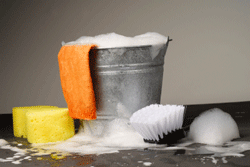Contributed by Bill Walker, Turbine Engine Tech Rep.

Preventive maintenance will help reduce the operating costs of aircraft engines.
I was recently asked by a customer, “Is it possible to wash my Pratt & Whitney engine too much?” The operator considered his inquiry to be silly when, in fact, it’s a very valid question. In fact, it’s important to periodically clean your engine as a part of preventive maintenance. And, if you operate your aircraft in adverse environments, such as air pollution and salt-water exposure, it’s very important to increase your wash schedule. Here's why.
Reduce Corrosion
Chemical reactions with the fuel and heat can produce severe corrosion, which can be significantly reduced through regular gas path washing. Although corrosion is not covered by the Eagle Service Plan (ESP) or warranted by Pratt & Whitney Canada (P&WC), the company does allow for the customer to determine their own wash schedule giving consideration to their specific operating environment.
Improve Performance
A desalination wash uses water or water/methanol to remove salt and light deposits, but if the engine is experiencing a loss of performance, as indicated from Engine Condition Trend Monitoring (ECTM), a performance recovery water wash will be recommended. Cleaning agents are used to remove deposits that cannot be dissolved by a desalination wash. Pratt publishes a list of acceptable cleaning agents, including a formula they developed called WCT (2 parts Witconate HC59B, 4 parts Carbitol and 1 part Triethanolamine), in chapter 71 of the maintenance manual.
It is very important to observe the maintenance manual requirements of using methanol when the outside air temperature requires mixing with the cleaning agent or rinsing solutions. As a practice, Duncan Aviation does not perform a water wash in outside air temperatures of less than 0°c / 32°f.
Reduce Operating Costs
The answer to the original question is “NO.” Periodically, rinse the external portions of the engine and if you are flying in adverse environments, absolutely, increase your wash schedule. Preventive maintenance, especially when dealing with corrosion, will reduce the operating costs of the engines, the added expense of repairing corrosion and additional downtime.
Duncan Aviation is a Pratt & Whitney Authorized Service Center for JT15D, PT6, 300,500,600 series engines. For a complete list of our PW engine maintenance capabilities, technical support and service sales contacts, please visit www.duncanaviation.aero/engine/pw.php.
Bill Walker serves as an Engine Tech. Rep. for Duncan Aviation-Battle Creek, specializing in CF34, JT15D, PT6A Turboprop, and PW300, 500 and 600 engines. His aviation career began in 1979.


